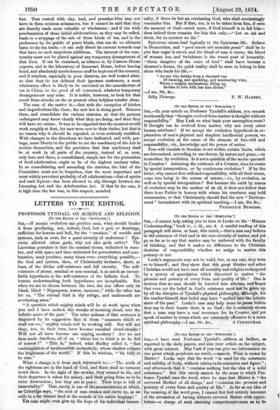LETTERS TO THE EDITOR.
PROFESSOR TYNDALL ON SCIENCE AND RELIGION.
[TO THE EDITOR OF THE SPECTATOR-1
Sun,—If atomic evolution can produce man, what should hinder it from producing, not, indeed, God, but a god, or demiurge, sufficient for heaven and hell, for the " creation " of worlds and systems, such as ours, for a quasi-eternity of endurance ? Epi- curus allowed otiose gods, why not also gods active? The Lueretian postulate is that the seminal atoms, unlimited in num- ber, and with space and time unlimited for permutation and com- bination, must produce, many times over, everything possible,— the God and system, then, of Christianity inclusive, short, at least, of the divine self-existence and full eternity. The self. existence of atoms, seminal or non-seminal, is as much an unveri- fiable hypothesis as the self-existence of the Infinite God. To human understanding, both hypotheses are inexplicable. But when we are to choose between the two, the one offers only its blank, blind "Nequaquam, temere, incassum ;" while the other has for us, "The eternal God is thy refuge, and underneath are everlasting arms."
"A question which mighty minds will be at work upon when you and I have melted, like streaks of morning cloud, into the infinite azure of the past." The utter sadness of that sentence is disguised by its suggestion that in those "summers which we shall not see," mighty minds will be working still. But will not they, too, in their turn, have become vanished cloud-streaks ? Will not all have become one might x mockery? Are we not thus made dwellers, all of us, where but to think is to be full of sorroir ?" "This is," indeed, what Shelley called it, "that contemplation of inexhaustible melancholy, whose shadow eclipses the brightness of the world." If this be wisdom, " 'tis folly to be wise."
What a change is it from such o'opoikapia to,—" The souls of the righteous are in the hand of God, and there shall no torment touch them. In the sight of the unwise, they seemed to die, and their departure is taken for misery, and their going from us to be utter destruction ; but they are in peace. Their hope is full of immortality!" That, surely, is one of the annunciations at which, as Coleridge says, "the soul of man awakes and starts up, as an exile in a far distant land at the sounds of his native language."
Yet man might even give up the hope of his individual immor-
tality, if there be but an everlasting God, who shall everlastingly remember him. But if that, too, is to be taken from him, if even
the memory of. God—much more, if God himself is to fail him—
then indeed there remains for him this only,—" Let us eat and drink, for to-morrow we die."
Epicurean atoms lead logically to the Epicurean life. Believe in Demociitus, and "quad sancta viri sententia poscit" shall be to
you that sugar is sweet, and the blood of man is warm; the blood of woman too, and Swinburne is the truest poet of humanity. "Stern daughter of the voice of God" shall have become a dreamer's dream, the quick reality shall be seen to belong to him alone who leads his life,—
“ As one who drinks from a charmed cup
Of foaming, and sparkling, and murmuring wine, Whom a mighty enchantress, filling up. Invites to love with her kiss divine.'
—I am, Sir, &c.,






























 Previous page
Previous page